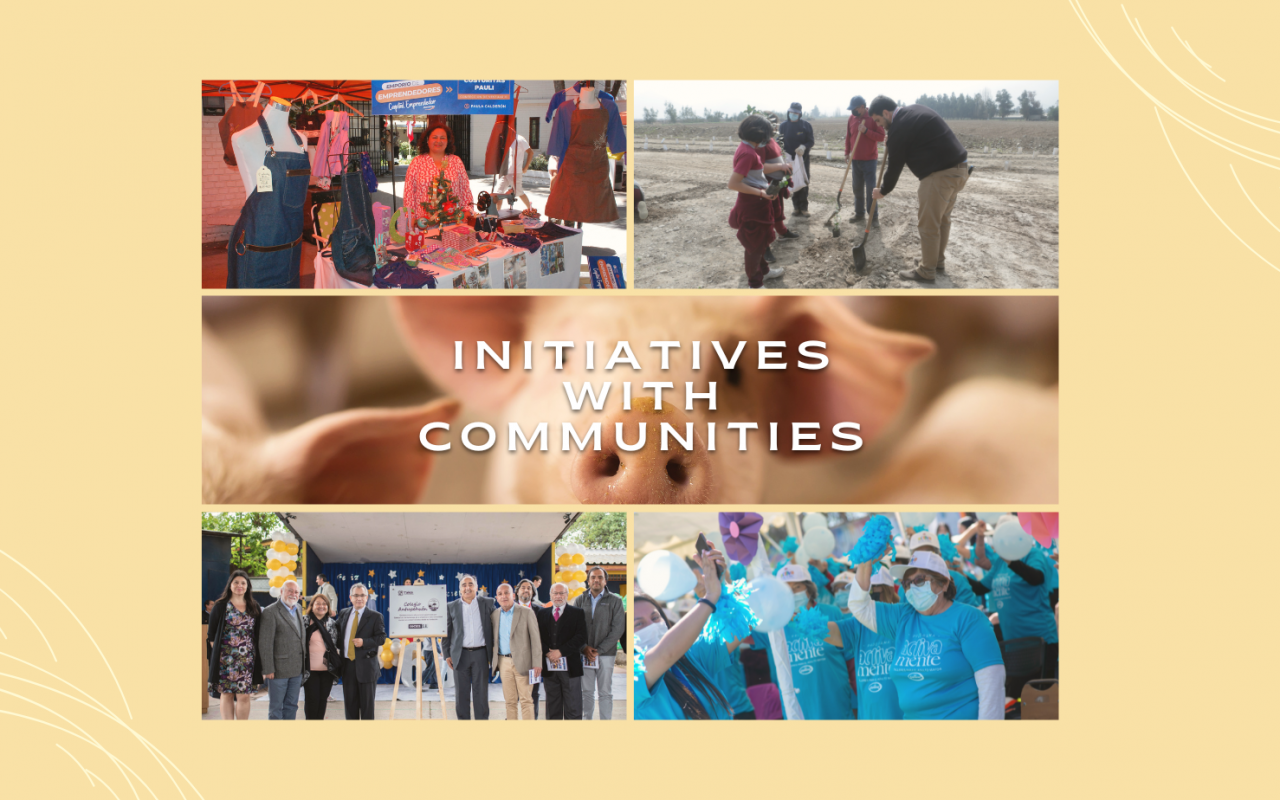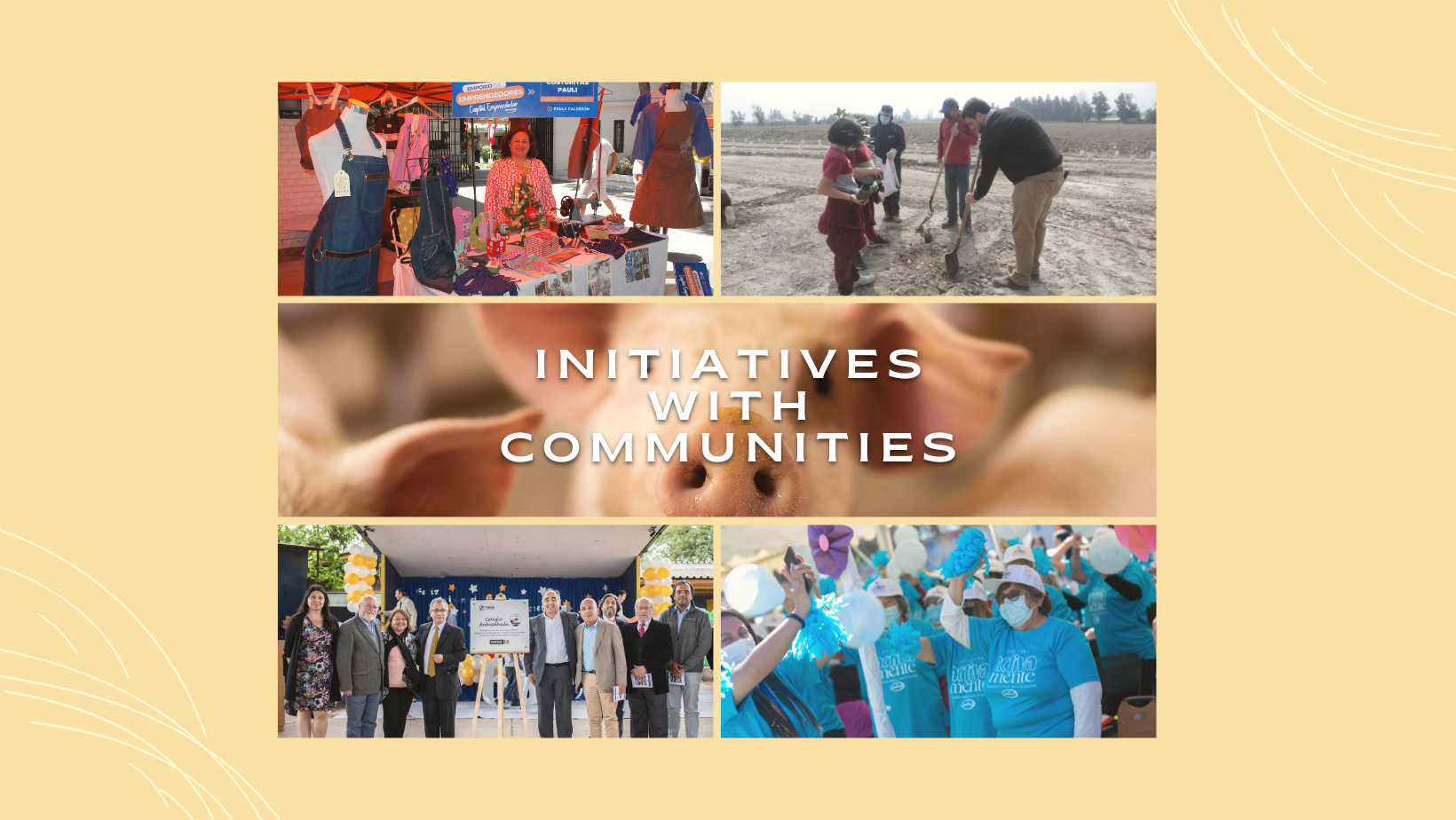
Working hand in hand with communities: a key pillar of the Chilean pork industry
Entrepreneurship initiatives, work with older adults, the promotion of physical activity, support for educational activities, and local development are just some of the areas where pork producers and exporters do outreach work with their communities. The Chilean pork industry shares a common focus on building strong and trusting relationships with its neighboring communities. The industry’s […]

Entrepreneurship initiatives, work with older adults, the promotion of physical activity, support for educational activities, and local development are just some of the areas where pork producers and exporters do outreach work with their communities.
The Chilean pork industry shares a common focus on building strong and trusting relationships with its neighboring communities. The industry’s companies actively involve the community through consultations, meetings, and joint projects, and strive to be active in local development and have a positive impact on their environment. On the path to sustainability, they consider the “social dimension” to be one of the key pillars of the industry’s operation and its contribution to the economic development of Chile.
“At Coexca, we firmly believe in the importance of building strong and trusting relationships with the community. We understand that our commitment goes beyond our operations and that we must contribute to the development of the territories where we are present (…) We seek out sustainable relationships with a long-term outlook based on transparency, open dialogue, and active listening. We actively involve the community in our decisions and activities through permanent communication channels and participation mechanisms. We believe in the importance of building mutually beneficial and collaborative relationships and recognize the fundamental role the community has in our development,” commented Rodrigo León, Coexca’s Corporate Affairs and Sustainability Manager.
A concrete example of this approach is the “Community School.” Since 2012, Coexca has sponsored the Antupehuén School in the Chilean city of Talca (Maule Region) and thus supported the educational process of children. This collaboration has brought about meaningful bonds with parents, guardians, and members of the school community. The company supports projects to purchase educational materials and also fully supports students’ school transportation and field trips. In addition, since 2022, Coexca has expanded its commitment to the Carrizal Municipal School in the city of San Javier, located just 10 minutes from the San Agustín del Arbolillo farm (Linares, Maule Region). Work has begun on joint projects with this new school community. Support has initially been provided for a field trip for the schoolchildren, as well as a school visit with the intention of furthering this collaboration in the near future.
Representing Agrosuper, Rafael Prieto, Corporate Affairs and Sustainability Manager, points out that: “Since our very beginnings, we have sought to create lasting ties with neighboring communities and build relationships of trust based on transparent and direct dialogue to contribute to the development of our environment. To achieve this purpose, we have implemented different outreach programs under four pillars of work: entrepreneurship, local development, healthy living, and education. Over the last year, we have been able to help over 330,000 residents of communities where we have productive facilities thanks to the implementation of our different programs.”
“Activamente” is one of Agrosuper’s featured initiatives, which seeks to promote physical and mental activity among older adults. It provides workshops developed by health professionals and self-care tools to this segment of the population. There is also the “Capital Emprendedor” program, which aims to boost the skills of entrepreneurs in the areas where the company operates and to promote and strengthen the businesses of local entrepreneurs through training, mentoring, and the provision of capital for a three-year period.
Maxagro showcases its focus on sustainability and commitment to local communities as part of its corporate fabric. The company has implemented MaxComunidad, a group of three programs carried out with the support of the NGO Corporación Simón de Cirene. “MaxComunidad encompasses the “Impulso Emprendedor” program, which provides management tools to strengthen the businesses of small entrepreneurs. We supported 41 entrepreneurs during 2022 and this year we are implementing a new version with 46 entrepreneurs from the regions of O’Higgins and Ñuble. A second program is the Community Leaders School, which strengthens the skills of leaders of social organizations through practical workshops, and which we are currently implementing with 35 people from these same regions. And lastly, the “Impulso Local Sustentable” program, which implements community support projects based on the needs indicated by the neighbors themselves. Last year it included the construction of a multi-purpose sports field, the installation of solar lights in various neighborhoods, and improvements to equipment in different community meeting places,” says Pablo Espinosa, Maxagro’s General Manager.
In addition, Agrícola AASA has created a biodiversity space in the San Esteban district, which has led to the creation of special ties with the local community. In September 2022, Agrícola AASA inaugurated a protected biodiversity area within the Aguas Claras hatchery in the presence of officials and the educational community of San Esteban (Valparaíso Region). This project has enabled the planting of over 4,000 m2 of native trees, such as boldos, quillayes, and peumos, with the aim of promoting the development of wild flora and fauna in the community. “For Agrícola AASA, community relations are not just something we need to do or that we cannot forget. They are a structural to our work, since we are part of the community. In other words, we are another neighbor in every area where we are present. This is why, as neighbors, we have a responsibility to local growth, producing cultural and social changes”, said Alejandro Gebauer, AASA’s Head of Management and Projects.
These are some examples of the companies producing and exporting pork, which also participate in the Chile Conscious Origin program that promotes sustainable practices in the industry. Within the program’s standards, the social dimension, which includes community relations, represents 27% of the total required to obtain certification, ranking second in importance after the environmental dimension. Within the social dimension, one of the most relevant aspects is community relations, and pig and poultry companies must comply with it to achieve certification. These requirements include identifying the communities located in the area of influence of these companies’ operations, as well as the development of a solid Community Relations Plan covering the facilities and their surroundings. This plan must include a comprehensive diagnosis and the allocation of resources to carry out the proposed measures. This is how it aims to establish a harmonious and mutually beneficial relationship for both parties.
The incorporation of the social dimension by pork meat producers and exporters reflects the industry’s commitment to establish a balanced and constructive relationship with local communities. There is recognition that sustainability is not only limited to environmental aspects, but also seeks to strengthen ties with people and promote projects that produce real and measurable benefits.
